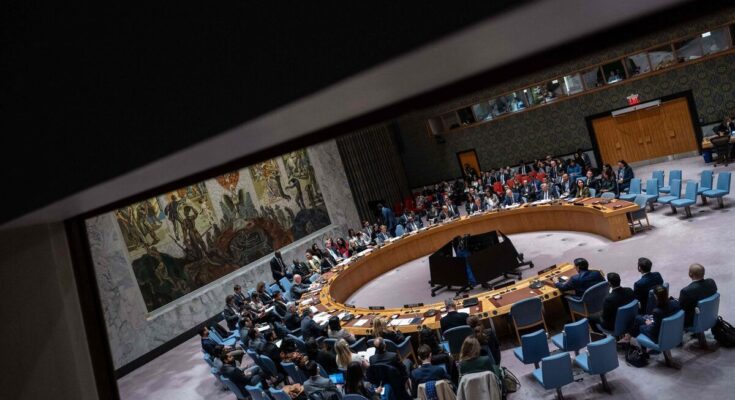The UN Security Council on Monday voted in favor of Donald Trump’s Gaza peace plan, which specifically provides for the deployment of international troops, under pressure from the United States which warned of the risk of a restart of the war.
Thirteen members of the Council supported the text, which America’s UN Ambassador Mike Waltz described as “historic and constructive”. Russia and China abstained.
The American resolution, which was amended several times during sensitive negotiations, “supports” the American president’s plan to allow the establishment of a fragile ceasefire between Israel and Hamas on October 10 in the Palestinian territories hit by a two-year war sparked by a bloody attack by the Palestinian Islamist movement on October 7, 2023.
An “international stabilizing force”
The text, seen by AFP, “authorizes” the creation of an “international stabilization force” (ISF) responsible in particular for supporting border security in cooperation with Israel and Egypt, the demilitarization of Gaza, the disarmament of “non-state armed groups”, the protection of civilians and the training of Palestinian police forces. The composition of this force is not stated.
The resolution, which is supported by the Palestinian Authority, also mandates until December 31, 2027 a “Peace Committee”, a body for a “transitional government” in Gaza until the Palestinian Authority is reformed. According to the attached 20-point plan, this committee should be chaired by Donald Trump.
Different from the first version, the resolution mentions the possibility of establishing a Palestinian state. Following the reform of the Palestinian Authority and progress in the reconstruction of Gaza, “conditions may finally exist for a credible path to Palestinian self-determination and statehood”, the text said.
No Palestinian state for Israel
The future is clearly rejected by Israel. “Our opposition to a Palestinian state in any region has not changed,” Prime Minister Benjamin Netanyahu stressed on Sunday. His Internal Security Minister, Itamar Ben Gvir, a far-right figure, on Monday called for the arrest of President Mahmoud Abbas and the killing of other senior Palestinian officials if the UN were to recognize a Palestinian state.
Before the vote, Israel’s ambassador to the UN, Danny Danon, emphasized to the press a “fundamental demand”, supported by his American counterpart Mike Waltz: the return of the bodies of the last three hostages still in Gaza.
For France, which supports the resolution, it “responds to the most urgent needs of society and makes it possible to support ongoing peace efforts.” “We confirmed that the text (…) contains important elements for us, and in particular references to the prospect of a Palestinian state,” the diplomatic source added.
Lots of reluctance
Russia, circulating a conflicting text, justified this initiative in particular by the fact that the American resolution did not sufficiently address this last point, and affirmed its “unwavering commitment” to the two-state solution. The Russian text, which the AFP also consulted on, authorizes neither the creation of a Peace Committee nor the deployment of troops at this stage, and calls on the UN Secretary General to propose “options” in the matter.
Other member states expressed their reluctance, concerned about the unclear mandate of the Peace Committee and the ISF. Facing what it calls “attempts to sow discord,” the United States has redoubled its efforts in recent days to push the Security Council to give the green light.
“Any refusal to support this resolution is either supporting the continued rule of the terrorist Hamas or supporting continuing war with Israel, condemning the region and its people to eternal conflict,” stressed American Ambassador to the UN Mike Waltz in a text published in the Washington Post on Friday.
America also highlighted its strong support for the text, issuing a joint statement with Qatar, Egypt, the United Arab Emirates, Saudi Arabia, Indonesia, Pakistan, Jordan and Turkey.



